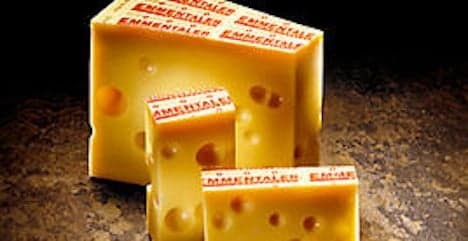Swiss cheese exports dented by price war

The Swiss cheese industry expanded exports in 2012 despite a strong franc and a troubled world economy, although price cutting by competitors slowed sales in the latter half of the year.
Cheese sales abroad rose 3.7 percent last year from 2011, although exports of standard bearers Appenzeller and Gruyère dipped, Switzerland Cheese Marketing said on Friday.
A total of 66,905 tons of cheese, cheese spreads and fondue mixtures were shipped out of the country, up 2,388 tons from the previous year.
After a good start to the year — with exports up almost nine percent in the first six months — Swiss cheeses lost ground.
“Our competitors — especially the big enterprises — lowered their prices,” Manuela Sonderegger, spokeswoman for Swiss Cheese Marketing in Bern told The Local.
The Swiss cheese industry had to contend with a price war, in addition to the strong franc, which makes products from Switzerland more expensive in foreign countries, Sonderegger said.
But overall sales remained robust in much of Europe, which accounts for 85 percent of the Swiss cheese market.
“This really shows people appreciate the quality and people are ready to pay more for good cheese,” Sonderegger said.
Emmentaler (17,863 tons), Gruyère (11,527 tons) and Appenzeller (5,183 tons) account for more than half (51.7 percent) of total cheese exports.
Sonderegger acknowledged that with tougher economic times “when people have to look after their money, Swiss cheese is a luxury product”.
Exports to the US, “where they are really price sensitive”, dropped 16 percent.
Appenzeller exports fell eight percent and Gruyère dipped 1.5 percent, while foreign sales of other varieties such as Tête du Moine, Vacherin Fribourgeois, Tilsiter, Raclette and Sbrinz were also lower.
This was offset by sharply higher sales of Mozzarella and specialty cheeses.
Meanwhile, overall sales in Germany, Switzerland’s biggest market, jumped more than 12 percent to 29,347 tonnes, compensating for declines in Italy (11,874 tons, 2.9 percent lower) and France (5,889 tons, down 10 percent).
Other markets in the EU were positive, including Britain, where Swiss cheese imports rose more than 12 percent.
The exception was Spain, severely impacted by the economic crisis, where sales plunged more than 25 percent, although the country is a relatively small importer of Swiss cheese to begin with.
Sonderegger contrasted the Swiss cheese industry with that of other countries, where large factories mass produce products.
“We have 600 cheese makers, mostly little dairies with one to four people working,” she said.
Swiss cheeses may be more expensive than others, but they are hand-made, without additives, from locally produced milk, Sonderegger noted.
“We continue to work on cheese quality and people working (in the industry) are proud of their product.”
Comments
See Also
Cheese sales abroad rose 3.7 percent last year from 2011, although exports of standard bearers Appenzeller and Gruyère dipped, Switzerland Cheese Marketing said on Friday.
A total of 66,905 tons of cheese, cheese spreads and fondue mixtures were shipped out of the country, up 2,388 tons from the previous year.
After a good start to the year — with exports up almost nine percent in the first six months — Swiss cheeses lost ground.
“Our competitors — especially the big enterprises — lowered their prices,” Manuela Sonderegger, spokeswoman for Swiss Cheese Marketing in Bern told The Local.
The Swiss cheese industry had to contend with a price war, in addition to the strong franc, which makes products from Switzerland more expensive in foreign countries, Sonderegger said.
But overall sales remained robust in much of Europe, which accounts for 85 percent of the Swiss cheese market.
“This really shows people appreciate the quality and people are ready to pay more for good cheese,” Sonderegger said.
Emmentaler (17,863 tons), Gruyère (11,527 tons) and Appenzeller (5,183 tons) account for more than half (51.7 percent) of total cheese exports.
Sonderegger acknowledged that with tougher economic times “when people have to look after their money, Swiss cheese is a luxury product”.
Exports to the US, “where they are really price sensitive”, dropped 16 percent.
Appenzeller exports fell eight percent and Gruyère dipped 1.5 percent, while foreign sales of other varieties such as Tête du Moine, Vacherin Fribourgeois, Tilsiter, Raclette and Sbrinz were also lower.
This was offset by sharply higher sales of Mozzarella and specialty cheeses.
Meanwhile, overall sales in Germany, Switzerland’s biggest market, jumped more than 12 percent to 29,347 tonnes, compensating for declines in Italy (11,874 tons, 2.9 percent lower) and France (5,889 tons, down 10 percent).
Other markets in the EU were positive, including Britain, where Swiss cheese imports rose more than 12 percent.
The exception was Spain, severely impacted by the economic crisis, where sales plunged more than 25 percent, although the country is a relatively small importer of Swiss cheese to begin with.
Sonderegger contrasted the Swiss cheese industry with that of other countries, where large factories mass produce products.
“We have 600 cheese makers, mostly little dairies with one to four people working,” she said.
Swiss cheeses may be more expensive than others, but they are hand-made, without additives, from locally produced milk, Sonderegger noted.
“We continue to work on cheese quality and people working (in the industry) are proud of their product.”
Join the conversation in our comments section below. Share your own views and experience and if you have a question or suggestion for our journalists then email us at [email protected].
Please keep comments civil, constructive and on topic – and make sure to read our terms of use before getting involved.
Please log in here to leave a comment.